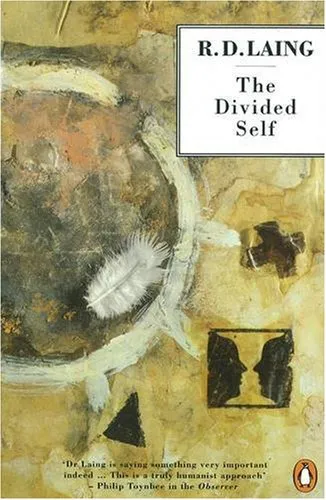The Divided Self. An Existential Study in Sanity and Madness
4.5
بر اساس نظر کاربران

شما میتونید سوالاتتون در باره کتاب رو از هوش مصنوعیش بعد از ورود بپرسید
هر دانلود یا پرسش از هوش مصنوعی 2 امتیاز لازم دارد، برای بدست آوردن امتیاز رایگان، به صفحه ی راهنمای امتیازات سر بزنید و یک سری کار ارزشمند انجام بدینمعرفی کتاب "The Divided Self. An Existential Study in Sanity and Madness"
کتاب "The Divided Self. An Existential Study in Sanity and Madness"، نوشتهی روانپزشک برجسته، ر. د. لنگ، یکی از آثار تاثیرگذار در زمینهی روانپزشکی و فلسفهی وجودگرایی است. این کتاب به تحلیل پدیدهی ناشناخته و پیچیدهی روانگسیختگی (Schizophrenia) از دیدگاه فلسفهی وجودگرایانه میپردازد.
خلاصه جامع کتاب
کتاب "The Divided Self" به بررسی عمیق وضعیت دوگانگی روانی و تجربهی ذهنی افرادی میپردازد که از حالتهای شدید روانپریشی رنج میبرند. لنگ معتقد است که مشکلات روانی اغلب نتیجهای از فروپاشی درک انسانی و ارتباطات اجتماعی هستند. او در این کتاب تلاش میکند که تجربهی فردی و پیچیدگیهای درونی بیماران را از منظر روانشناسی وجودی شرح داده و مفهومسازی جدیدی از سلامت روان ارائه دهد.
نکات کلیدی کتاب
- روانگسیختگی بهعنوان نوعی گسست در تعاملات انسانی و از خودبیگانگی بررسی میشود.
- نگاه وجودگرایانه به انسان، توجه به تجربههای زیسته و فردی را مهمترین امور در تشخیص و درمان میداند.
- لنگ تاکید بر اهمیت درک ذهنی و جهانی خواب برای فهم بهتر حالات روانی دارد.
جملات معروف از کتاب
One cannot divorce the human condition in madness from the human condition in sanity any more than one can separate the human condition in Asia from the human condition in Europe.
Madness need not be all breakdown. It may also be breakthrough.
چرا این کتاب اهمیت دارد
این کتاب با ترکیب روانپزشکی و فلسفه به رویکردی کاملاً جدید در فهم مشکلات روانی میپردازد. اهمیت این کتاب به دلیل شکستن پیشفرضهای سنتی درباره روانگسیختگی و ارائهی دیدگاهی نوین برای درک بهتر وضعیت دوگانگی روانی است. با تمرکز بر تجربههای ذهنی و فردی، لنگ نشان میدهد که چگونه میتوان به پژوهش روانگسیختگی با نگاهی انسانمحورانه نزدیک شد. چنین رویکردی میتواند به بهبود شیوههای درمانی و فهم بهتر از خود و دیگران منجر شود.
Introduction
Welcome to an exploration of R.D. Laing’s seminal work, The Divided Self: An Existential Study in Sanity and Madness. This groundbreaking book delves into the intricate dynamics of mental health, challenging conventional understandings of sanity and madness by exploring the lived experiences of those we often label as "mentally ill."
Detailed Summary
R.D. Laing's The Divided Self posits that mental illness, particularly conditions like schizophrenia, can be understood as an intelligible response to the painful experiences of living. Written during the 1960s, a time when the world of psychiatry was undergoing upheavals, Laing's text offers a radical shift away from the medical model's reliance on biological determinism. Instead of viewing mental disturbances as mere symptoms of chemical imbalances, Laing argues for a more holistic understanding of these conditions as responses to existential factors.
In the book, Laing introduces the concept of ontological insecurity—a state where the individual’s sense of reality and consistent identity is fragmented by overwhelming threats to their inner world. These threats may arise from interpersonal relationships, societal pressures, or alienating experiences that lead to a divided self. Using vivid case studies and theoretical reflections, Laing illustrates how the construction of false selves emerges as a coping mechanism to protect the ontologically insecure individual.
Laing’s work is not just a theoretical exposition; it is deeply compassionate, urging practitioners to genuinely understand the subjective experiences of their patients. By listening and engaging with these experiences, he believes that we can foster healing and reintegration, helping the divided self find coherence and authenticity once more.
Key Takeaways
- Mental illness can be a rational response to alienating life experiences.
- ‘Ontological insecurity’ is central to understanding the existential experience of madness.
- The therapeutic process should focus on understanding the patient’s lived experience.
- Laing challenges the biomedical model of mental disorders, advocating for a more humanistic approach.
Famous Quotes from the Book
"We are all in a post-hypnotic trance induced in early infancy."
"Existential phenomenology seeks to comprehend the human as he is.
"The condition of alienation, of being asleep, of being unconscious, of being out of one’s mind, is the condition of the normal man."
Why This Book Matters
Laing’s The Divided Self remains a cornerstone in existential and humanistic psychology. It is a testament to the importance of empathy and understanding in mental health care. In an era dominated by medication and diagnostic manuals, Laing’s work is a refreshing reminder of the complexity of the human experience and the necessity of addressing the emotional and existential underpinnings of mental distress.
His insights have inspired a generation of psychologists, therapists, and philosophers to consider the broader dimensions of human existence. The book challenges us to rethink our definitions of sanity and madness, urging society to embrace individuals’ lived experiences without judgment or stigma. Recognizing the intelligent and communicative aspects of what has been traditionally categorized as insanity, Laing opens doors for more inclusive and empathetic models of care.
دانلود رایگان مستقیم
شما میتونید سوالاتتون در باره کتاب رو از هوش مصنوعیش بعد از ورود بپرسید
دسترسی به کتابها از طریق پلتفرمهای قانونی و کتابخانههای عمومی نه تنها از حقوق نویسندگان و ناشران حمایت میکند، بلکه به پایداری فرهنگ کتابخوانی نیز کمک میرساند. پیش از دانلود، لحظهای به بررسی این گزینهها فکر کنید.
این کتاب رو در پلتفرم های دیگه ببینید
WorldCat به شما کمک میکنه تا کتاب ها رو در کتابخانه های سراسر دنیا پیدا کنید
امتیازها، نظرات تخصصی و صحبت ها درباره کتاب را در Goodreads ببینید
کتابهای کمیاب یا دست دوم را در AbeBooks پیدا کنید و بخرید
1297
بازدید4.5
امتیاز50
نظر98%
رضایتنظرات:
4.5
بر اساس 0 نظر کاربران
"کیفیت چاپ عالی بود، خیلی راضیام"
Questions & Answers
Ask questions about this book or help others by answering
No questions yet. Be the first to ask!


